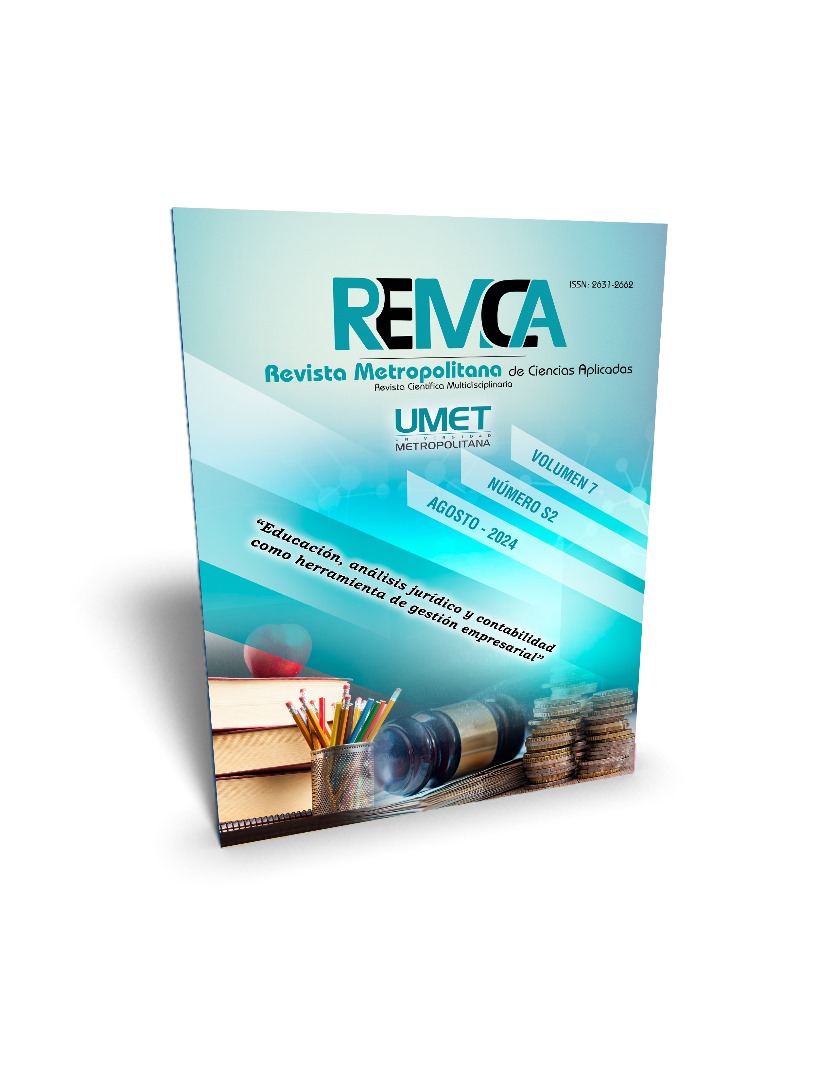Auditoría continua y monitorización en tiempo real: detección, mitigación de riesgos empresariales en industrias hoteleras
DOI:
https://doi.org/10.62452/q62zma54Palabras clave:
Auditoría, Control constitucional, riesgos, Tecnología, sostenibilidadResumen
La auditoría continua implica una supervisión constante de riesgos y controles, utilizando tecnología avanzada y análisis de datos para proporcionar garantías en tiempo real a la dirección. En esta investigación centrada en la industria hotelera de Francisco de Orellana, Ecuador, como objetivo principal se examinó la implementación y efectividad de esta práctica en la gestión de riesgos. Se empleó una metodología mixta basada en encuestas y análisis de datos. Los resultados revelaron una alta adopción de la auditoría continua, con beneficios reveladores como la detección temprana de riesgos y la reducción de pérdidas financieras. Se destacó la correlación entre la automatización de la recolección de datos y la eficacia en la detección de fraudes. El estudio resalta la importancia de estas herramientas, con un 90% de los encuestados reconociendo su eficacia para mejorar la gestión en la industria hotelera. La integración de herramientas digitales surge como un pilar esencial para garantizar la sostenibilidad y competitividad del sector.
Descargas
Referencias
Arévalo, C. (2022). Importancia de la gestión de riesgos dentro de las empresas. https://www.piranirisk.com/es/blog/conozca-la-importancia-de-la-gestion-de-riesgos-dentro-de-las-empresas
Baz, J. (2021). Evolución de la industria hotelera: el uso de la tecnología para crear oportunidades más allá de la habitación y de la crisis. https://reporterohotelero.com/evolucion-de-la-industria-hotelera-el-uso-de-la-tecnologia-para-crear-oportunidades-mas-alla-de-la-habitacion-y-de-la-crisis/
Beltrán, C., & Murcia, J. (2016). Métodos para identificación de peligros, análisis, evaluación y tratamiento de los riesgos en Colombia. Revista Ingeniería, Matemáticas y Ciencias de la Información, 3(6), 29-38. http://dx.doi.org/10.21017/rimci.2016.v3.n6.a12
Bumgarner, N., & Vasarhelyi, M. (2018). Continuous Auditing—A New View. En, D. Y. Chan, D.Y., V. Chiu y M. A. Vasarhelyi (Ed.), Continuous Auditing (Rutgers Studies in Accounting Analytics). (pp. 7-51). Emerald Publishing Limited, Leeds.
Cevallos, D., Moreno, C., & Cevallos R. (2018). Importancia de la auditoria de comunicación interna en las organizaciones. Revista Espacios, 39(42). https://www.revistaespacios.com/a18v39n42/a18v39n42p37.pdf
Dávalos, Á. (2013). Auditoría de seguridad de información. Fides et Ratio - Revista de Difusión Cultural y Científica de la Universidad La Salle en Bolivia, 6(6), 19-30. http://www.scielo.org.bo/scielo.php?pid=S2071-081X2013000100004&script=sci_abstract
Doria Parra, A., Lopez Benavides, L., Bonilla Ferrer, M., & Parra Cera, G. (2019). Metodología para la implementación de la gestión de riesgo en un sistema de gestión de calidad. SIGNOS - Investigación En Sistemas De gestión, 12(1), 123-135. https://doi.org/10.15332/24631140.5424
Duchi, B. (2022). Auditoría continua mediante la aplicación de la ley de Benford en el sector financiero. (Tesis de Maestría). Pontifica Universidad Católica del Ecuador.
Loli, H. (2019). auditoría de gestión y su influencia en la operatividad de las empresas hoteleras de Lima metropolitana. (Tesis para obtener el título de Contador Público). Universidad de San Martín de Porres.
Paredes Murcia, A., & León Cárdenas, M.J. 2020. La auditoría: fuente de información estratégica en la industria hotelera. Turismo y Sociedad, 28, 207–229. https://doi.org/10.18601/01207555.n28.10
Rojas, J., & Escobar, M. (2021). Beneficios del uso de tecnologías digitales en la auditoría externa: una revisión de la literatura. Revista Facultad de Ciencias Económicas: Investigación y Reflexión, 29(2), 45 - 65. https://doi.org/10.18359/rfce.5170
Teaganne, F., & Downie, A. (5 de diciembre de 2023). ¿Qué es la mitigación de riesgos? https://www.ibm.com/es-es/topics/risk-mitigation
Valencia, F., & Tamayo, J. (2017). Modelos de auditoría continua: una propuesta taxonómica. JISTEM: Journal of Information Systems and Technology Management, 14(3), 463–481. https://www.redalyc.org/pdf/2032/203254259010.pdf
Verde, L., Villareal, T., & Reyes, N. (2023). Gestión de auditoría como herramienta estratégica de los servicios hoteleros. Revista de Investigación en Ciencias de la Administración, 7(26), 192-201. http://doi.org/10.33996/revistaenfoques.v7i26.165
Yánez, J. (2012). Auditorías, mejora continua y normas ISO: factores clave para la evolución de las organizaciones. Ingeniería Industrial. Actualidad y Nuevas Tendencias, 3(9), 83-92. https://www.redalyc.org/articulo.oa?id=215026158006
Descargas
Publicado
Número
Sección
Licencia
Derechos de autor 2024 Evelyn Ivette Bósquez-Andrade, Mireya Magdalena Torres-Palacios (Autor/a)

Esta obra está bajo una licencia internacional Creative Commons Atribución-NoComercial-CompartirIgual 4.0.
Los autores que publican en la Revista Metropolitana de Ciencias Aplicadas (REMCA), están de acuerdo con los siguientes términos:
1. Derechos de Autor
Los autores conservan los derechos de autor sobre sus trabajos sin restricciones. Los autores otorgan a la revista el derecho de primera publicación. Para ello, ceden a la revista, de forma no exclusiva, los derechos de explotación (reproducción, distribución, comunicación pública y transformación). Los autores pueden establecer otros acuerdos adicionales para la distribución no exclusiva de la versión de la obra publicada en la revista, siempre que exista un reconocimiento de su publicación inicial en esta revista.
© Los autores.
2. Licencia
Los trabajos se publican en la revista bajo la licencia de Atribución-NoComercial-CompartirIgual 4.0 Internacional de Creative Commons (CC BY-NC-SA 4.0). Los términos se pueden consultar en: https://creativecommons.org/licenses/by-nc-sa/4.0/deed.es
Esta licencia permite:
- Compartir: copiar y redistribuir el material en cualquier medio o formato.
- Adaptar: remezclar, transformar y crear a partir del material.
Bajo los siguientes términos:
- Atribución: ha de reconocer la autoría de manera apropiada, proporcionar un enlace a la licencia e indicar si se ha hecho algún cambio. Puede hacerlo de cualquier manera razonable, pero no de forma tal que sugiera que el licenciador le da soporte o patrocina el uso que se hace.
- NoComercial: no puede utilizar el material para finalidades comerciales.
- CompartirIgual: si remezcla, transforma o crea a partir del material, debe difundir su creación con la misma licencia que la obra original.
No hay restricciones adicionales. No puede aplicar términos legales ni medidas tecnológicas que restrinjan legalmente a otros hacer cualquier cosa que la licencia permita.




